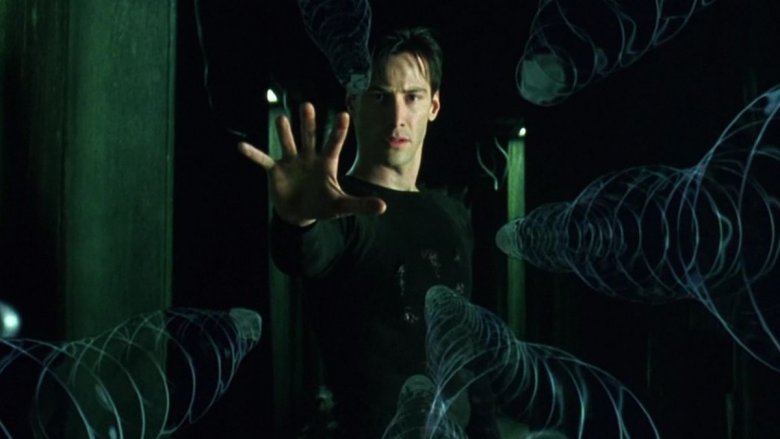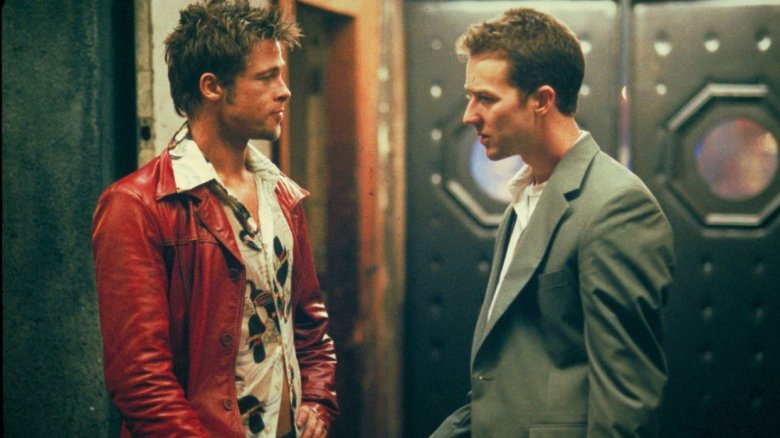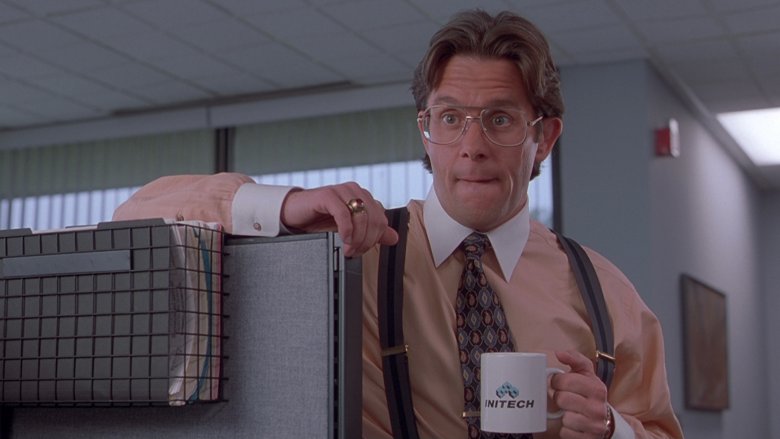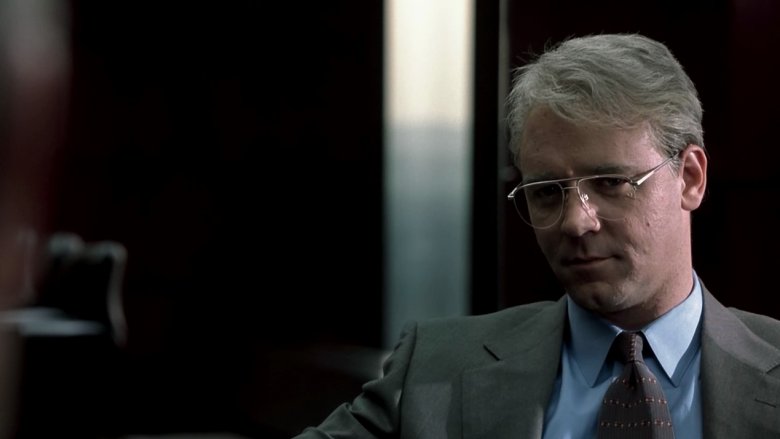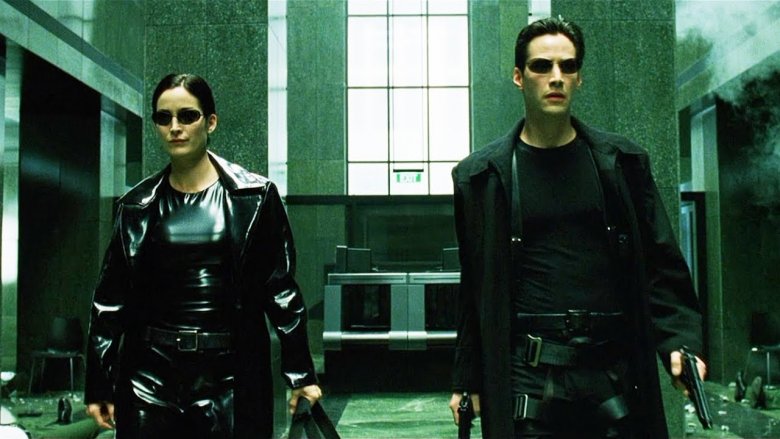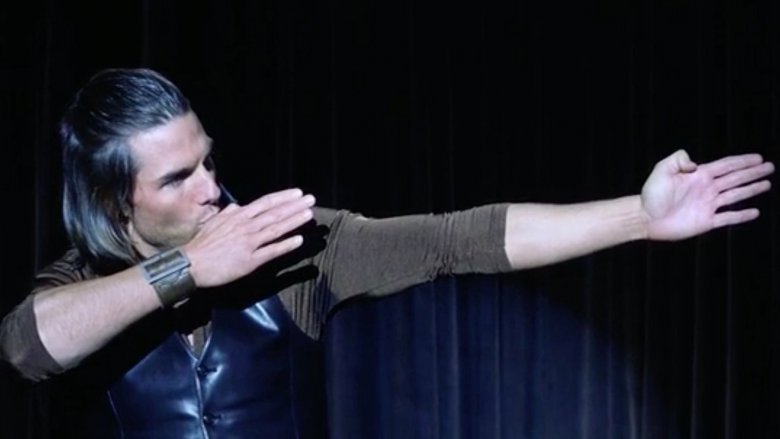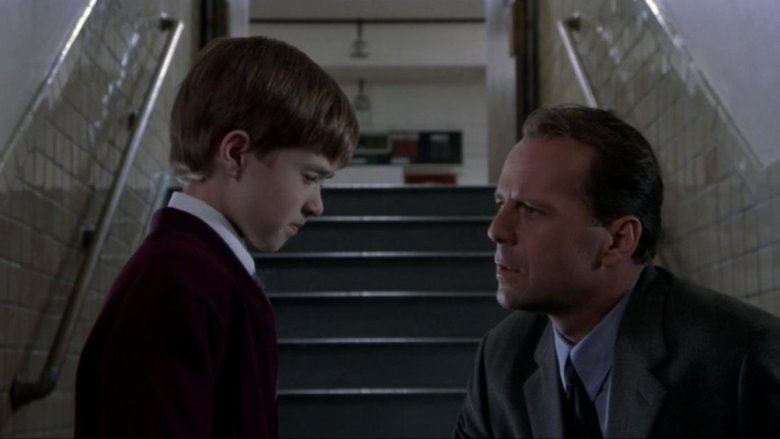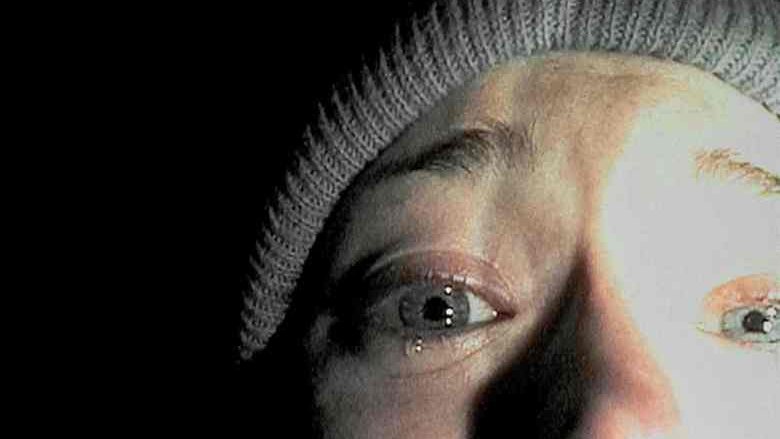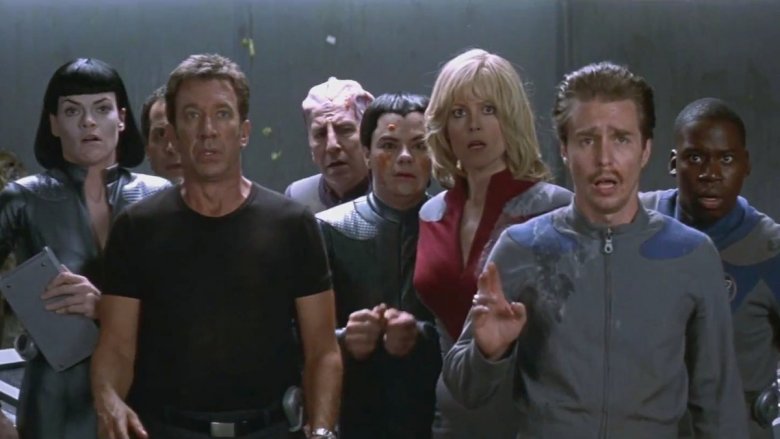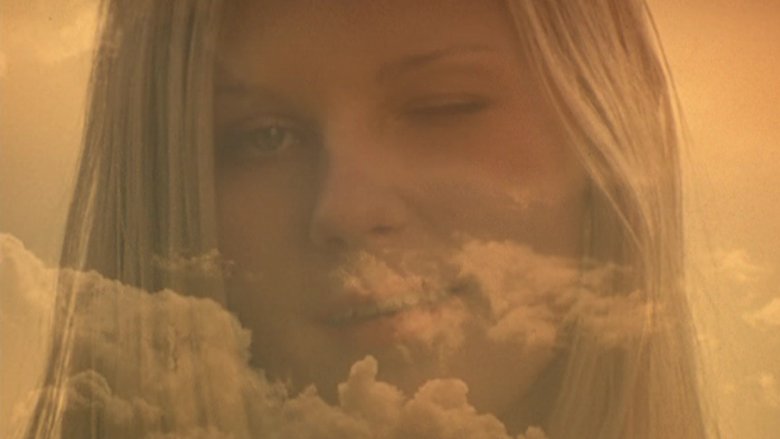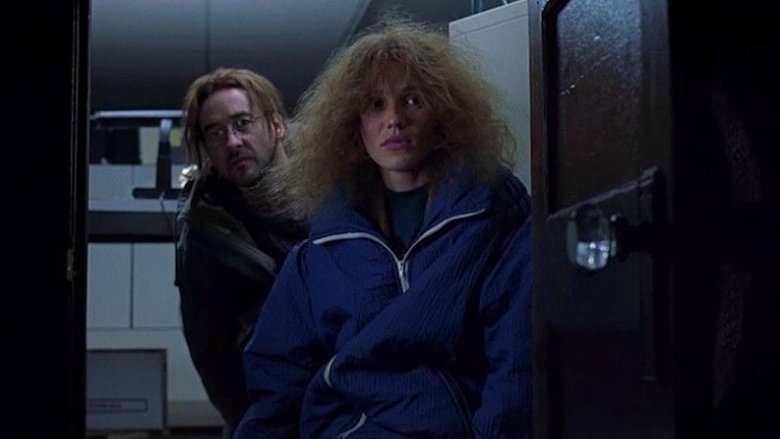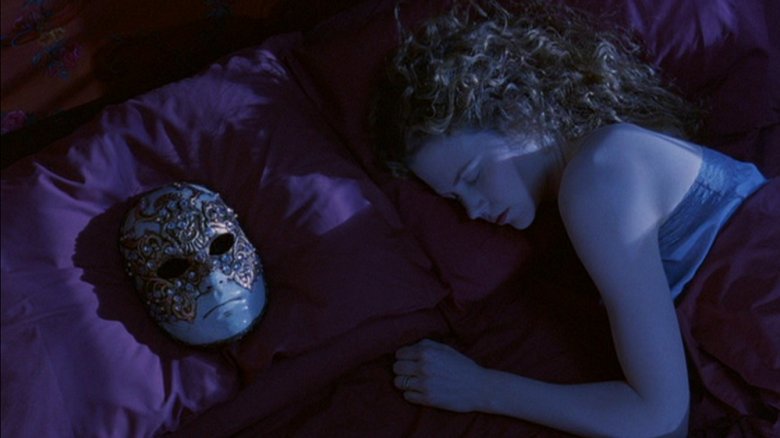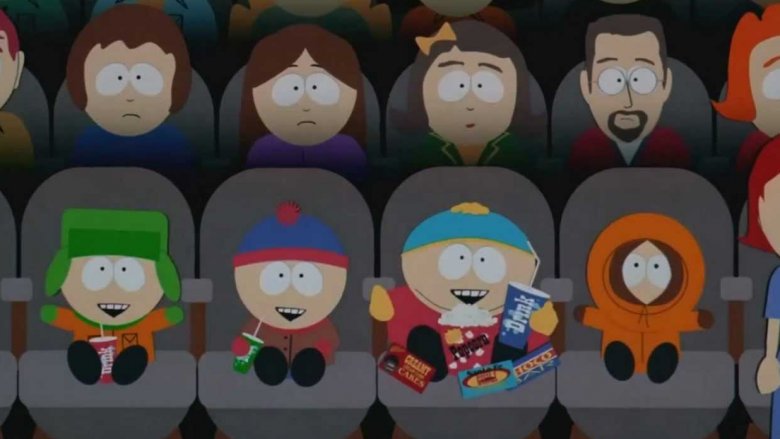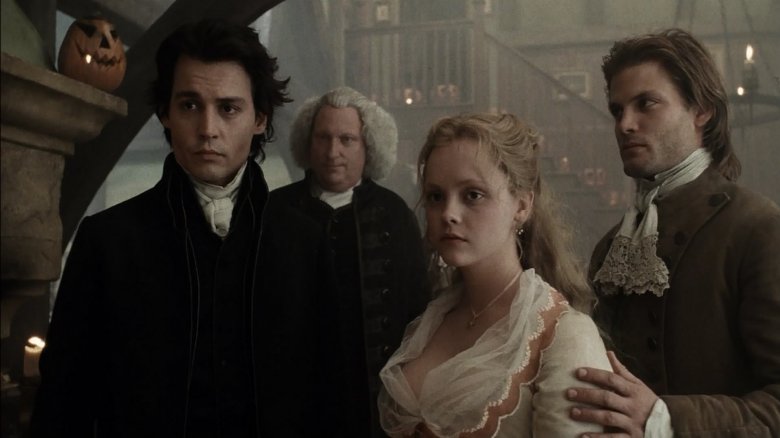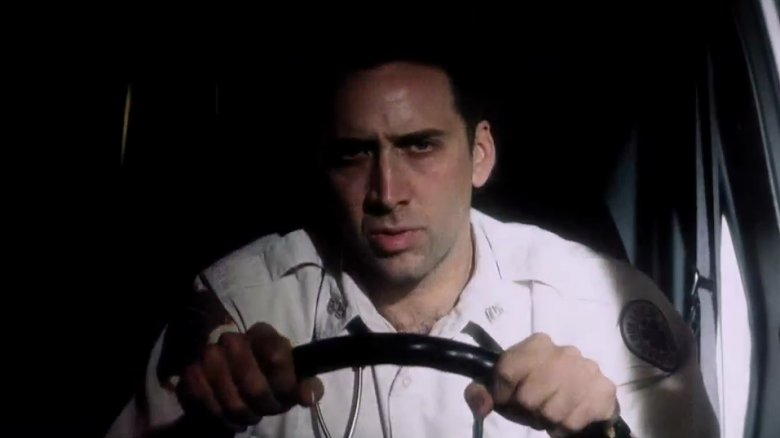Awesome Movies Turning 20 In 2019
Like the world it so nobly aims to mirror, cinema is unpredictable. Some years at the cineplex are worth remembering, while there are others we'd rather forget. But every so often, the stars align to help Hollywood spin one of those "memorable" years into something truly unforgettable.
With a dazzling slate of films sprung from the minds of some of cinema's boldest filmmakers, 1999 was not just a memorable year for movies, but one so absurdly impressive that it saw the final masterwork from one of cinema's greatest auteurs, a game-changing/generation-defining sci-fi epic, a couple of mind-bending twist endings, and at least two instant classic editions to the horror genre hitting theaters within the same 12-month span. Here are a few of 1999's masterpieces that are well worth discovering and/or revisiting in 2019, as they approach their 20th birthdays.
Fight Club
As the 20th century drew to a close, society seemed to be spinning headlong into a bit of an identity crisis. It's only fitting, then, that 1999 was the year that Fight Club — based on Chuck Palahniuk's caustic bruiser of a bestselling novel — brawled its way into theaters and left the world asking, "Did you know about Tyler Durden?"
Unless you were a fan of Palahniuk's book — or had Fight Club's head-spinning third act twist spoiled prior to seeing the film — the answer to that question was likely no. For the record, that twist is one for the record books, and a big reason that (whether you knew about Durden or not), watching director David Fincher's Fight Club adaptation unfold was so much fun.
Part scathing indictment of corporate/consumer culture, part deconstruction of modern masculine mythos, and (if only inadvertently) part exploration of white male privilege, Fincher's film is a take-no-prisoners look at a society on the brink of mindlessly eating itself alive — and in desperate need of a little anarchy. Fronted by Edward Norton, Brad Pitt, and a marvelously manic Helena Bonham-Carter, anarchy is just what Fincher and crew deliver with the brutal, bleak, wickedly funny, and incisive bare-knuckle bout that is Fight Club — which remains just as potent and full of surprises 20 years later.
Office Space
Though it takes a dramatically different approach to the subject matter, Mike Judge's acerbic office comedy Office Space seems cut from the same thematic cloth as Fight Club. After all, they're both concerned with the soul-crushing materialism of society, and both follow an office drone so drained that he becomes desperate to find a way out.
Rather than allow his hypnotist-fractured psyche to lead start an underground fight club anarchist revolution, Judge's protagonist takes a slightly more capitalist approach to personal anarchy — he enlists his buddies in a scheme to shake down the soulless corporation he works for.
If you've seen Office Space, you know how hilariously wrong that scheme goes, but the film isn't overly concerned with the heist. Nor is Judge's film concerned with completely condemning the corporate culture it so brilliantly skewers. Rather, Judge uses the setting and plot of Office Space to spin a not-so-satirical, laugh-out-loud farce about how effortlessly corporations and consumerism devour individuality. Even while condemning the culture, Office Space is also that rare film that also understands many, many people are just fine toiling away in the corporate digestive system — so long as they get to keep their sweet Swingline stapler — and that if you aren't one of them, well, nobody's making you stay.
The Insider
Doing the right thing is never easy. These days, it seems harder than ever before to not just do the right thing, but also to know what the right thing is to begin with. While we'd like to look back on 1999 with rose-colored glasses and pretend things were different then, the truth is the battle to see people stand up and do the right thing has raged since the dawn of man, and will only continue to rage amidst man's murky future. That timeless struggle — and the often unforeseeable consequences of actually taking action — is at the center of Michael Mann's harrowing whistleblower drama The Insider, and it's just one of the reasons this taut, stylish, paranoid thriller resonates so deeply.
For those who haven't seen it, The Insider follows the incredible true story of research chemist Jeffrey Wigand (a never-better Russell Crowe) who went on 60 Minutes to take down Big Tobacco, only to see his life unravel as a result. As a film, The Insider is a white-knuckle thriller about corruption, journalistic integrity, and the cost of doing the right thing that happens to tout Al Pacino's last great performance, and a turn from Crowe that should've netted him his first Oscar. It's also a stark, penetrating drama about holding the powerful accountable in the face of diabolical corporate malfeasance, which makes The Insider well worth revisiting for those who count themselves among the fighters.
The Matrix
It's almost impossible to imagine now, but prior to the release of The Matrix, almost nobody knew who the hell the Wachowskis were. They had, after all, only two films to their names, and one of them — the perfectly dreadful Stallone/Banderas actioner Assassins — earned them a mere shared screenwriting credit. Even their sleek, inventive crime thriller Bound went all but unnoticed upon release. Needless to say, exceptions were all but non-existent for the Wachowskis' followup — billed as a tech-savvy, effects-driven action flick featuring Keanu Reeves.
To say the Wachowskis got Hollywood's attention when The Matrix hit theaters in March of 1999 would be an understatement. It was the entire planet that actually took notice, and that notice was well earned. Not only was The Matrix a heady, character-driven tale of man vs. technology run amok, it was also a groundbreaking visual feat/treat/leap forward that shaped sci-fi for a generation. It also proved a creative and commercial success that the Wachowskis could never quite repeat. They can hopefully take heart knowing that even 20 years after its release, The Matrix feels as fresh and profound as ever... and still totally worthy of that "Whoa."
Magnolia
After delivering back-to-back stunners with his first two films, Hard Eight and Boogie Nights, director Paul Thomas Anderson had many in the business hailing him as the next Scorsese. New Line Cinema stepped up to produce the follow-up, and he delivered a sprawling, $37 million art film that followed a dozen or so loosely connected lives through a single day — and ever-changing weather patterns — in the San Fernando Valley.
Clocking in at a whopping three hours and eight minutes, Magnolia marked Anderson's most ambitious and personal project to date. It's a film that seamlessly combined the director's penchant for high melodrama with his flair for grandiose set pieces and meticulously observed, character-driven narratives, all against a billboard-sized canvas and dealing with a near-supernatural sense of fate barely glimpsed in his previous films. The result is a kaleidoscopic mosaic of a movie that proved to be one of 1999's most challenging films as well as one of its most rewarding. On its 20th anniversary, it remains one of Anderson's best.
The Sixth Sense
Of all the fantastic/fantastical movies released in 1999, few had quite the cultural impact enjoyed by M. Night Shyamalan's spellbinding supernatural thriller The Sixth Sense. Featuring a star turn from Bruce Willis, one of the greatest child performances in history from Haley Joel Osment, and a mind-blowing twist ending, Shyamalan's masterpiece arrived in theaters under a shroud of mystery and almost overnight became a legitimate cultural phenomena that cleared well north of half a billion dollars at the box office, earned six Academy Award nominations, and made a household name of the man who wrote and directed.
Over the years, Hollywood — and Shyamalan himself — has repeatedly tried and mostly failed to reproduce the bracing impact of the film's twisty narrative. Because Shyamalan's vision is so skillfully executed and vividly realized, The Sixth Sense has only grown in esteem as a result, and the film's hefty emotional impact still lands whether you know its secrets or not. In fact, part of the fun of rewatching The Sixth Sense is searching for clues that you missed the first three or four or five times through. What's most frequently overshadowed by the film's twists and ghostly chills is that, at its core, it's also a tenderly observed drama about grief and loss and a troubled youth learning to accept the burdens of a gift he never asked for. That Shyamalan fitted such high drama into a genuinely unsettling ghost story also makes The Sixth Sense the stuff of genre legend.
The Blair Witch Project
Speaking of genre legend, just a week prior to The Sixth Sense arrived, another stunning though decidedly smaller-scaled supernatural confection hit theaters in The Blair Witch Project. Conceived and directed by newcomers Daniel Myrick and Eduardo Sanchez, and starring unknown actors, the groundbreaking no-budget feature follows three film students who get lost in the woods while shooting a documentary about a small-town urban legend. As they struggle to find their way back to society, it becomes clear they're not alone in the woods, and may be being stalked by the Blair Witch herself.
While that would've been enough to make an interesting horror film in its own right, it's how Myrick and Sanchez executed and marketed their story that really made the The Blair Witch Project stand apart from pretty much every found-footage flick made before or since. The directors essentially dropped their actors off in the woods, orchestrated spooky events on a daily basis, and had their performers shoot the action themselves. The result is gritty and patently terrifying, and looks and feels a little too real for comfort. They doubled down on that realism by setting up a genius marketing campaign that sold the film to audiences as a real-life documentary. The stark realism both baffled and enthralled film lovers, which helped make The Blair With Project one of the most profitable movies ever produced.
Galaxy Quest
The 1990s saw Tim Allen making headlines on the small screen with his hit ABC series Home Improvement, but the actor's big-screen ventures were decidedly hit or miss. Luckily, what movie lovers got when Galaxy Quest soared into theaters wasn't exactly a Tim Allen movie — rather, an ensemble comedy sporting the estimable tents of Sigourney Weaver, Alan Rickman, and Sam Rockwell that spun its meta premise into comedic gold.
Galaxy Quest follows the cast of a popular science fiction TV series who, after reuniting for a sci-fi convention, find themselves playing their roles for real when an alien species enlists captain and crew to defend them from an evil alien race. Allen in particular is great in a role that's both with and against type, though he's frequently usurped by scene-stealing turns from Weaver, Rockwell, and a never sillier/more sardonic Rickman (who proves here that there really was no role he couldn't play). While Galaxy Quest did solid box office upon release, it's become a cult classic in the years since, and there's no better time to rediscover this comic gem than on its 20th anniversary.
The Virgin Suicides
History has taught us that young directors are all but doomed to fail with their first feature film. You can double the odds of failure if that filmmaker is born of cinema royalty, and maybe even triple those odds if said would-be director has already failed as an actor. With the odds more than stacked against her, there was little reason to think Sofia Coppola's The Virgin Suicides would be anything more than a potentially intriguing beginning to a career behind the camera. Hell, even the film's grim subject matter — bluntly conferred in its title — seemed to doom Coppola's directorial debut to failure.
The Virgin Suicides was anything but a failure. In fact, the film succeeds so completely that it heralded the birth of a bold new auteur with as much vision and ambition as her famous father. Adapted from Jeffrey Eugenides' acclaimed novel of the same name, the movie follows a group of teen boys who obsess over the beautiful, mysterious, and dangerously sheltered Lisbon sisters as they edge ominously toward their untimely demise. It's often a grim affair, and audiences all but ignored The Virgin Suicides in theaters. Luckily, folks have continued to discover Coppola's debut in the years since. If you're not among them, we'd like to inform you that 20 years is simply too long to have not seen this daring, stylish, utterly heartbreaking opus.
Being John Malkovich
Sofia Coppola wasn't the only burgeoning auteur to hit a home run with a debut feature in 1999. Her then-husband Spike Jonze did too, and his wild, frenetic, endlessly creative Being John Malkovich actually netted him an Oscar nomination for Best Director. Of course, Malkovich was hardly Jonze's first gig in the director's chair. The adventurous filmmaker spent the bulk of the '90s honing his skills and developing his style while directing music videos for the likes of Beastie Boys, Weezer, Sonic Youth, Daft Punk, and Björk.
Where some directors gravitate toward gritty realism and dense personal drama, Jonze opts to take those same elements and bolster them with visually arresting, semi-whimsical narratives rife with absurdist flights of fancy and breathtaking stylistic flourishes. Jonze's style proved more than ideal for Being John Malkovich, which was scripted by Charlie Kaufman — the poet-laureate of the outlandish/fanciful/eerily eccentric.
Being John Malkovich — which follows the beautifully bizarre tale of a puppeteer who discovers a portal into the head of the titular thespian — is dripping with fantastical flourishes from both writer and director. It features show-stopping performances from John Cusack, Cameron Diaz, Catherine Keener, and Malkovich. And it takes more risks (visually and intellectually) than half the films on even this list; all of which makes Being John Malkovich not just one of the best films of 1999, but one of the all-time greats.
Eyes Wide Shut
Whether you like his movies or not, Stanley Kubrick is and always will be regarded as one of the greatest — if not the greatest — directors that ever lived. Whether it was any good or not, his final film would be one that cinephiles world would pore over, debate, watch, and rewatch until the end of time. To that end, Kubrick — who spent his career pushing the limits of cinema with technically flawless, narratively challenging, morally ambiguous art films — continued to push buttons beyond the grave with his moody, masterfully executed, sexually charged swan song Eyes Wide Shut.
Based on the 1926 novella Traumnovelle, the film follows a man who, after a shocking revelation from his wife, sets out on a perilous, night-long odyssey of sexual ambivalence and moral torment. No, that summation doesn't quite illustrate the enigmatic power of Kubrick's kinky, semi-surrealist nightmare. It doesn't inform the complex personal quandaries explored by the husband and wife in question (brilliantly portrayed by Tom Cruise and Nicole Kidman) either. Nor does it divulge the amount of blood, sweat, and tears each put into the film's torturous, two-and-a-half year production. While we may never see Kubrick's final cut of his erotic drama (deemed NC-17 by the MPAA and recut after his passing), the Eyes Wide Shut that hit theaters in 1999 remains a haunting final work worth poring over, debating, watching, and rewatching.
South Park: Bigger, Longer & Uncut
In the decades since television invaded U.S. households, filmmakers have been trying and mostly failing to adapt television shows into cinematic events. There have, however, been a few unexpected successes along the way, and of that small sample set, South Park: Bigger, Longer & Uncut — Trey Parker and Matt Stone's musical adaptation of their raunchy, absurdist animated series — stands as one of the very best.
That has a lot to do with the fact that Parker and Stone don't set out to reinvent the wheel with South Park's first big-screen venture, peppering their film with the filthy dialogue, jaw-dropping sight gags, and piercing social commentary that's earned their long-running series one of TV's most fervid fanbases. Somehow, Bigger, Longer & Uncut sees the duo pushing the bounds of good taste beyond even their own bawdy standards. True to that, the film feels bigger, filthier, and more incisive than anything Parker and Stone had attempted before, and possibly even after.
Unlike most adaptations of TV shows, South Park: Bigger, Longer & Uncut succeeds in never feeling like an extended version of the half-hour series. Rather, the film sees its creators working on a visual scale light years beyond the TV show, and delivering a film that dazzles the eye even as it embraces the crudely stylistic animation that inspired it. That Parker and Stone manage all that while also including a handful of show-stopping, Oscar-nominated musical numbers just feels like showing off.
Sleepy Hollow
Tim Burton and Johnny Depp have hit a bit of a cold streak of late, but there was a time when the pairing was one of the most exciting in all of cinema. So when they announced they were re-teaming for an adaptation of Washington Irving's short story The Legend of Sleepy Hollow, there was more than a little excitement around the project, mostly because the story jibed so well with Burton's ability to make the bizarre and grotesque endearing and entertaining.
That's exactly what Burton did with Sleepy Hollow, which stands as a stunning work of gothic whimsy. A crackerjack piece of scripting from Seven scribe Andrew Kevin Walker — who transforms Irving's brief and brutal Headless Horseman fable into a complex murder mystery that pits the skittish Ichabod Crane as detective on the hunt for what appears to be a serial killer — is largely to thank. Of course, Crane finds something far more sinister afoot in the town of Sleepy Hollow, and a never-better Depp helps draw viewers further into the eerie unknown with a performance that teeters between awkward charm, cagey confidence, and nervy unease.
Coupled with a beautifully bleak visual palette courtesy of Emanuel Lubezki, and unforgettable appearances from Christina Ricci and Christopher Walken, Burton and crew transform Irving's classic into a gruesome, gothic fantasia that stands as the pinnacle of the Burton/Depp cinematic dynasty.
Bringing Out the Dead
Odds are you'd find a Martin Scorsese picture listed in most years that earn the title of "great year for movies." That list would absolutely include 1976 and Scorsese's first official masterpiece, the Paul Schrader-penned Taxi Driver. It would undoubtedly include 1980 and the pair's second collaboration in Raging Bull as well as 1988 and their third offering, The Last Temptation of Christ. If only for the sake of symmetry, you'd want to include the duo's masterful and misunderstood 1999 drama, Bringing Out the Dead.
Though it's the less heralded of the four films Scorsese and Schrader have made together, it's no less brash, or brutal, or philosophically profound as their prior collaborations — and it may actually outshine those others in terms of style, substance, and ethereal energy. It also happens to feature a marvelously unhinged Nicolas Cage as a disturbed, sleep-deprived paramedic spiraling into an abyss of despair as the ghosts of those he couldn't save haunt his every waking hour.
As with other Scorsese/Schrader films, Bringing Out the Dead is rife with themes of fractured faith, societal despair, and spiritual rebirth. It's also a gritty, unrelentingly bleak affair that can be painful to watch. But like those other films, it's a cinematic experience as emotionally unnerving as it is profoundly moving.
